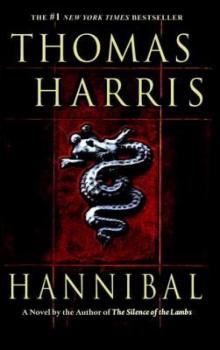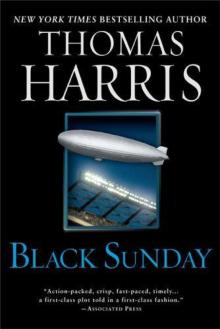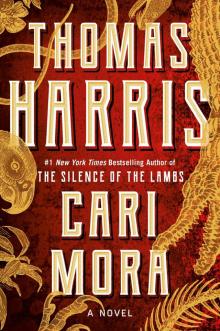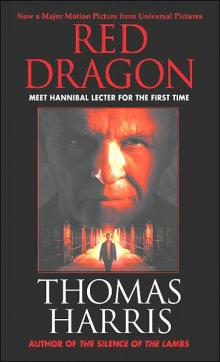- Home
- Thomas Harris
Hannibal Rising Page 4
Hannibal Rising Read online
Page 4
From the woods, they could see the flare of a second match on his face as the trooper lit the fuse.
“Is it orange or is it green?” Milko said. “Does it have stripes on it?”
Grutas did not answer. The soldier walked to the truck, taking his time, laughing as his companions on the truck yelled at him to hurry, the fuse sparking behind him on the snow.
Milko was counting under his breath.
As soon as the vehicle was out of sight, Grutas and Milko ran for the fuse. The fire in the fuse crossing the threshold now as they reached it. They could not make out the stripes until they were close. Burns at twominutesameter twominutesameter twominutesameter. Grutas slashed it in two with his spring knife.
Milko muttered “fuck the farm” and charged up the steps and into the castle, following the fuse, looking, looking, for other fuses, other charges. He crossed the great hall toward the tower, following the fuse and saw what he was looking for, the fuse spliced onto a big loop of detonating cord. He came back into the great hall and called out, “It’s got a ring main cord. That’s the only fuse. You got it.” Breeching charges were packed around the base of the tower to destroy it, coordinated by the single loop of detonating cord.
The Soviet troops had not bothered to close the front door, and their fire still burned on the hearth in the great hall. Graffiti scarred the bare walls and the floor near the fire was littered with droppings and bumwad from their final act in the relative warmth of the castle.
Milko, Grentz and Kolnas searched the upper floors.
Grutas motioned for Dortlich to follow him and descended the stairs to the dungeon. The grate across the wine room door hung open, the lock broken.
Grutas and Dortlich shared one flashlight between them. The yellow beam gleamed off glass shards. The wine room was littered with empty bottles of fine vintages, the necks knocked off by hasty drinkers. The tasting table, knocked over by contesting looters, lay against the back wall.
“Balls,” Dortlich said. “Not a swig left.”
“Help me,” Grutas said. Together they pulled the table away from the wall, crunching glass underfoot. They found the decanting candle behind the table and lit it.
“Now, pull on the chandelier,” Grutas told the taller Dortlich. “Just give it a tug, straight down.”
The wine rack swung away from the back wall. Dortlich reached for his pistol when it moved. Grutas went into the chamber behind the wine room. Dortlich followed him.
“God in Heaven!” Dortlich said.
“Get the truck,” Grutas said.
10
Lithuania, 1946
HANNIBAL LECTER, thirteen, stood alone on the rubble beneath the moat’s embankment at the former Lecter Castle and threw crusts of bread onto the black water. The kitchen garden, its bounding hedges overgrown, was now the People’s Orphanage Cooperative Kitchen Garden, featuring mostly turnips. The moat and its surface were important to him. The moat was constant; on its black surface reflected clouds swept past the crenellated towers of Lecter Castle just as they always had.
Over his orphanage uniform Hannibal now wore the penalty shirt with the painted words NO GAMES. Forbidden to play in the orphans’ soccer game on the field outside the walls, he did not feel deprived. The soccer game was interrupted when the draft horse Cesar and his Russian driver crossed the field with a load of firewood on the wagon. Cesar was glad to see Hannibal when he could visit the stable, but he did not care for turnips.
Hannibal watched the swans coming across the moat, a pair of black swans that survived the war. Two cygnets accompanied them, still fluffy, one riding on his mother’s back, one swimming behind. Three older boys on the embankment above parted a hedge to watch Hannibal and the swans.
The male swan climbed out onto the bank to challenge Hannibal.
A blond boy named Fedor whispered to the others. “Watch that black bastard flap the dummy— he’ll knock shit out of him like he did you when you tried to get the eggs. We’ll see if the dummy can cry.” Hannibal raised his willow branches and the swan went back into the water.
Disappointed, Fedor took a slingshot of red inner-tube rubber out of his shirt and reached into his pocket for a stone. The stone hit the mud at the edge of the moat, spattering Hannibal’s legs with mud. Hannibal looked up at Fedor expressionless and shook his head. The next stone Fedor shot splashed into the water beside the swimming cygnet, Hannibal raising his branches now, hissing, shooing the swans out of range.
A bell sounded from the castle.
Fedor and his followers turned, laughing from their fun, and Hannibal stepped out of the hedge swinging a yard of weeds with a big dirt ball on the roots. The dirt ball caught Fedor hard in the face and Hannibal, a head shorter, charged and shoved him down the steep embankment to the water, scrambling after the stunned boy and had him in the black water, holding him under, driving the slingshot handle again and again into the back of his neck, Hannibal’s face curiously blank, only his eyes alive, the edges of his vision red. Hannibal heaved to turn Fedor over to get to his face. Fedor’s companions scrambled down, did not want to fight in the water, yelling to a monitor for help. First Monitor Petrov led the others cursing down the bank, spoiled his shiny boots and got mud on his flailing truncheon.
Evening in the great hall of Lecter Castle, stripped now of its finery and dominated by a big portrait of Joseph Stalin. A hundred boys in uniform, having finished their supper, stood in place at plank tables singing “The Internationale.” Headmaster, slightly drunk, directed the singing with his fork.
First Monitor Petrov, newly appointed, and Second Monitor in jodhpurs and boots walked among the tables to be sure everyone was singing. Hannibal was not singing. The side of his face was blue and one of his eyes was half-closed. At another table Fedor watched, a bandage on his neck and scrapes on his face. One of his fingers was splinted.
The monitors stopped before Hannibal. Hannibal palmed a fork.
“Too good to sing with us, Little Master?” First Monitor Petrov said over the singing. “You’re not Little Master here anymore, you’re just another orphan, and by God you’ll sing!”
First Monitor swung his clipboard hard against the side of Hannibal’s face. Hannibal did not change his expression. Neither did he sing. A trickle of blood came from the corner of his mouth.
“He’s mute,” Second Monitor said. “No sense in beating him.”
The song ended and First Monitor’s voice was loud in the silence.
“For a mute, he can scream well enough at night,” First Monitor said, and swung with his other hand. Hannibal blocked the blow with the fork in his fist, the tines digging into First Monitor’s knuckles. First Monitor started around the table after him.
“Stop! Do not hit him again. I don’t want him marked.” Headmaster might be drunk, but he ruled. “Hannibal Lecter, report to my office.”
Headmaster’s office contained an army surplus desk and files and two cots. It was here that the change in the castle’s smell struck Hannibal most. Instead of lemon-oil furniture polish and perfume there was the cold stink of piss in the fireplace. The windows were bare, the only remaining ornament the carved woodwork.
“Hannibal, was this your mother’s room? It has a sort of feminine feeling.” Headmaster was capricious. He could be kind, or cruel when his failures goaded him. His little eyes were red and he was waiting for an answer.
Hannibal nodded.
“It must be hard for you to live in this house.”
No response.
Headmaster took a cable from his desk. “Well, you won’t be here much longer. Your uncle is coming to take you to France.”
11
THE FIRE ON THE kitchen hearth gave the only light. Hannibal in shadow watched the cook’s assistant asleep and drooling in a chair near the fire, an empty glass beside him. Hannibal wanted the lantern on the shelf just behind him. He could see the glass mantle gleam in the firelight.
The man’s breathing was deep and regular with a
rumble of catarrh. Hannibal moved across the stone floor, into the vodka-and-onion aura of the cook’s assistant, and came close behind him.
The wire handle of the lantern would creak. Better to lift it by the base and the top, holding the glass mantle steady so that it would not rattle. Lift it straight up and off the shelf. He had it now in both hands.
A loud pop, as a piece of firewood, hissing steam, burst in the fireplace, sending sparks and small coals skipping across the hearth, a coal coming to rest an inch from the assistant cook’s foot in its felt boot liner.
What tool was close? On the countertop was a canister, a 150-mm shell casing full of wooden spoons and spatulas. Hannibal set the lantern down and, with a spoon, flipped the coal to the center of the floor.
The door to the dungeon stairs was in the corner of the kitchen. It swung open quietly at Hannibal’s touch, and he went through it into absolute darkness, remembering the upper landing in his mind, and closed the door behind him. He struck a match on the stone wall, lit the lantern and went down the familiar stairs, the air cooling as he descended. The lantern light jumped from vault to vault as he passed through low arches to the wine room. The iron gate stood open.
The wine, long ago looted, had been replaced on the shelves with root vegetables, primarily turnips. Hannibal reminded himself to put a few sugar beets in his pocket—as Cesar would eat them in the absence of apples, though they turned his lips red, and gave him the appearance of wearing lipstick.
In his time in the orphanage, seeing his house violated, everything stolen, confiscated, abused, he had not looked here. Hannibal put the lantern on a high shelf and dragged some sacks of potatoes and onions from in front of the rear wine shelves. He climbed onto the table, gripped the chandelier and pulled. Nothing. He released the chandelier and tugged it again. Now he swung from it with his full weight. The chandelier dropped an inch with a jar that made the dust fly off it, and he heard a groan from the rear wine shelves. He scrambled down. He could get his fingers in the gap and pull.
The wine shelves came away from the wall with a considerable squeal of hinges. He went back to his lantern, ready to blow it out if he heard a sound. Nothing.
It was here, in this room, that he had last seen Cook, and for a moment Cook’s great round face appeared to him in vital clarity, without the scrim time gives our images of the dead.
Hannibal took his lantern and went into the hidden room behind the wine room. It was empty.
One large gilt picture frame remained, threads of canvas sticking out of it where the painting had been cut out of the frame. It had been the largest picture in the house, a romanticized view of the Battle of Žalgiris emphasizing the achievements of Hannibal the Grim.
Hannibal Lecter, last of his line, stood in the looted castle of his childhood looking into the empty picture frame in the knowledge that he was of his line and not of his line. His memories were of his mother, a Sforza, and of Cook and Mr. Jakov from a tradition other than his own. He could see them in the empty frame, gathered before the fire at the lodge.
He was not Hannibal the Grim in any way he understood. He would conduct his life beneath the painted ceiling of his childhood. But it was as thin as Heaven, and nearly as useless. So he believed.
They were all gone, the paintings with faces that were as familiar to him as his family.
There was an oubliette in the center of the room, a dry stone well into which Hannibal the Grim could cast his enemies and forget them. It had been fenced round in later years to prevent accidents. Hannibal held his lantern over it and the light gave out halfway down the shaft. His father had told him that in his own childhood a jumble of skeletons remained at the bottom of the oubliette.
Once as a treat, Hannibal had been lowered into the oubliette in a basket. Near the bottom, a word was scratched into the wall. He could not see it now by lantern light, but he knew it was there, uneven letters scratched in the dark by a dying man—the word “Pourquoi?”
12
IN THE LONG dormitory the orphans were sleeping. They were in the order of their age. The youngest end of the dormitory had the brooder-house smell of a kindergarten. The youngest hugged themselves in sleep and some called out to their remembered dead, seeing in the dreamed faces a concern and tenderness they would not find again.
Further along some older boys masturbated under their covers.
Each child had a footlocker and on the wall above each bed was a space to put drawings or, rarely a family photograph.
Here is a row of crude crayon drawings above the successive beds. Above Hannibal Lecter’s bed is an excellent chalk and pencil drawing of a baby’s hand and arm, arresting and appealing in its gesture, the plump arm foreshortened as the baby reaches to pat. There is a bracelet on the arm. Beneath the drawing, Hannibal sleeps, his eyelids twitching. His jaw muscles bunch and his nostrils flare and pinch at a dreamed whiff of cadaverine breath.
The hunting lodge in the forest. Hannibal and Mischa in the cold-dust smell of the rug rolled around them, ice on the windows refracting the light green and red. The wind gusts and for a moment the chimney does not draw. Blue smoke hangs in tiers under the peaked roof, in front of the balcony railing, and Hannibal hears the front door blast open and looks through the railing. Mischa’s bathtub is on the stove where the Cooker boils the little deer’s horned skull with some shriveled tubers. The roiling water bangs the horns against the metal walls of the tub as though the little deer is making a last effort to butt. Blue-Eyes and Web-Hand come in with a blast of cold air, knocking off their snowshoes and leaning them against the wall. The others crowd them, Bowl-Man stumping from the corner on frostbitten feet. Blue-Eyes takes from his pocket the starved bodies of three small birds. He puts a bird, feathers and all, into the water until it is soft enough to rip off the skin. He licks the bloody birdskin, blood and feathers on his face, the men crowding around him. He flings the skin to them and they fall on it like dogs.
He turns his blood-smeared face to the balcony, spits out a feather and speaks. “We have to eat or die.”
They put into the fire the Lecter family album and Mischa’s paper toys, her castle, her paper dolls. Hannibal is standing on the hearth now, suddenly, no sense of descending, and then they are in the barn, where clothing was wadded in the straw, child’s clothing strange to him and stiff with blood. The men crowded close, feeling his meat and Mischa’s.
“Take her, she’s going to die anyway. Come and play, come and play.”
Singing now, they take her. “Ein Mannlein steht im Walde ganz still und stumm …”
He hangs on to Mischa’s arm, the children dragged toward the door. He will not release his sister and Blue-Eyes slams the heavy barn door on his arm, the bone cracking, opens the door again and comes back to Hannibal swinging a stick of firewood, thud against his head, terrific blows falling on him, flashes of light behind his eyes, banging, Mischa calling “Anniba!”
And the blows became First Monitor’s stick banging on the bed frame and Hannibal screaming in his sleep, “Mischa! Mischa.”
“Shut up! Shut up! Get up you little fuck!” First Monitor ripped the bedclothing off the cot and threw it at him. Outside on the cold ground to the toolshed, prodded with the stick. First Monitor followed him into the shed with a shove. The shed was hung with gardening tools, rope, a few carpenter’s tools. First Monitor set his lantern on a keg and raised his stick. He held up his bandaged hand.
“Time to pay for this.”
Hannibal seemed to cringe away, circling away from the light, feeling nothing he could name. First Monitor read fear and circled after him, drawn away from the light. First Monitor got a good crack on Hannibal’s thigh. The boy was at the lantern now. Hannibal picked up a sickle and blew out the light. He lay down on the floor in the darkness, gripping the sickle in both hands above his head, heard scrambling footfalls past him, swung the sickle hard through the black air, struck nothing, and heard the door close and the rattle of a chain.
“The adva
ntage of beating a mute is he can’t tell on you,” First Monitor said. He and Second Monitor were looking at a Delahaye parked in the gravel courtyard of the castle, a lovely example of French coachwork, horizon blue, with diplomatic flags on its front fenders, Soviet and GDR. The car was exotic in the way of pre-war French cars, voluptuous to eyes accustomed to square tanks and jeeps. First Monitor wanted to scratch “fuck” in the side of the car with his knife, but the driver was big and watchful.
From the stable Hannibal saw the car arrive. He did not run to it. He watched his uncle go into the castle with a Soviet officer.
Hannibal put his hand flat against Cesar’s cheek. The long face turned to him, crunching oats. The Soviet groom was taking good care of him. Hannibal rubbed the horse’s neck and put his face close to the turning ear, but no sound came out of his mouth. He kissed the horse between the eyes. At the back of the hayloft, hanging in the space between double walls, were his father’s binoculars. He hung them around his neck and crossed the beaten parade ground.
Second Monitor was looking for him from the steps. Hannibal’s few possessions were stuffed in a bag.
13
WATCHING FROM HEADMASTER’S window, Robert Lecter saw his driver buy a small sausage and a piece of bread from the cook for a pack of cigarettes. Robert Lecter was actually Count Lecter now, with his brother presumed dead. He was already accustomed to the title, having used it illegitimately for years.
Headmaster did not count the money but shoved it into a breast pocket, with a glance at Colonel Timka.
“Count, eh, Comrade Lecter, I just want to tell you I saw two of your paintings at the Catherine Palace before the war, and there were some photos published in Gorn. I admire your work enormously.”
Count Lecter nodded. “Thank you, Headmaster. Hannibal’s sister, what do you know?”
“A baby picture is not much help,” Headmaster said.

 The Silence of the Lambs
The Silence of the Lambs Red Dragon
Red Dragon Hannibal
Hannibal Black Sunday
Black Sunday Cari Mora
Cari Mora Hannibal Rising
Hannibal Rising Red Dragon hl-1
Red Dragon hl-1 The Silence of the Lambs (Hannibal Lecter)
The Silence of the Lambs (Hannibal Lecter)